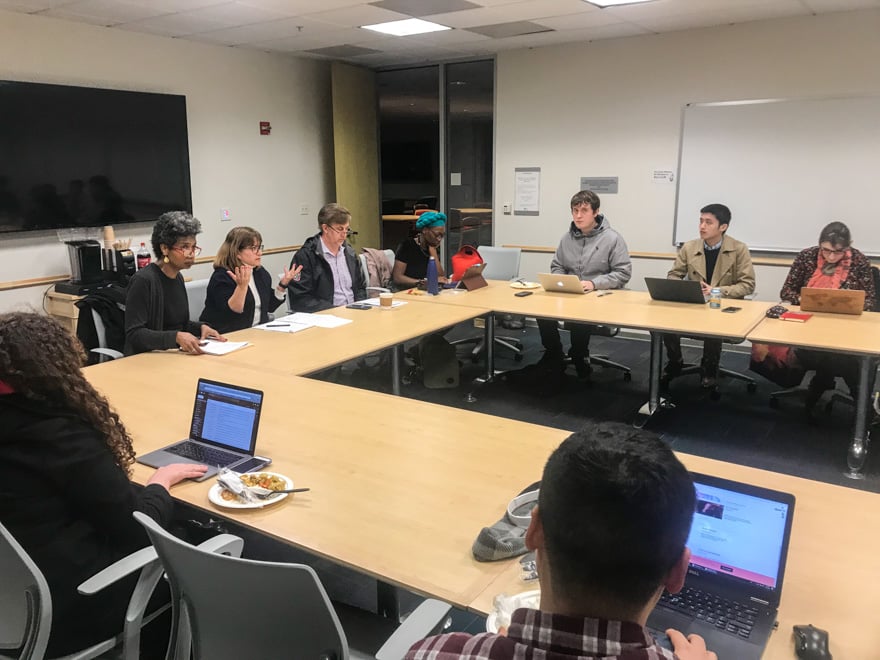Accessibility concerns dominated Wednesday’s Graduate Student Council (GSC) meeting as members discussed lifting course fees from students’ shoulders, removing rats from Building 70 and hosting all campus dining hall events in the Arrillaga Family Dining Commons (AFDC) as well.
The Council also unanimously approved a bill — passed last night by the Undergraduate Senate — to place amendments to the Associated Students of Stanford University (ASSU) Constitution on the spring elections ballot.
No more course fees?
Regardless of the method pursued, ASSU Director of First-Generation and/or Low-Income (FLI) Outreach Jeffery Rodriguez ’20 told the GSC he will be working on a “proposal to effectively remove course fees” after analyzing survey data and meeting with Vice Provost for Undergraduate Education Harry Elam.
Only 23 of the 193 student respondents of an ASSU survey on course fees and material costs have been graduate or coterminal students, said Rodriguez, who began circulating the survey on Monday and solicited feedback from the GSC on Wednesday.
Course fees range from as little as $30 for physical education classes to as much as $700 for piano classes or clubs such as equestrian club, Rodriguez said. He also noted that about $1 million is spent by students on course fees and material costs each year.
While grants are available, Rodriguez said, they must be requested by students. He added that not only FLI students suffer from course fees and material costs, as any student may be discouraged from paying extra to take a class that interests them.
“I looked into a music class once, and was totally off-put by the $300 or $400,” said councilmember and Latin American history Ph.D. candidate Mateo Carrillo. “Maybe it’s not my right to take a music class, but it would improve the Stanford experience.”
Carrillo proposed a system for students similar to BeWell, which rewards University employees with money for participating in wellness classes that require a nominal fee: “classes you would think [Stanford] would encourage you to take for your well-being,” Carrillo said.
“You make that money back and more because you are technically, hypothetically cutting health costs by being healthier,” he added.
Councilmember and Ph.D. candidate in theater and performance studies Kari Barclay said there are sometimes “hidden fees,” not shown in syllabi, by which professors assign projects that require materials that cost money out of students’ pockets. Barclay cited art supplies he purchased for work in a theater performance class as one example.
“Faculty and professors have so much leeway even VPTL can’t really wrangle it,” Rodriguez said. “It’s very unfair in some aspects.”
Barclay said he hopes to see a solution to student fees that omits the possibility of “annoying workarounds and loopholes.” One idea proposed in Wednesday’s meeting was having departments pay for students’ course fees, as GSC Social Chair and Division of Literatures, Cultures and Languages Ph.D. candidate Gabby Badica said the earth systems department does with its general fund.
Rodriguez said the next phase in student government is publicizing the effort through a resolution in the Undergraduate Senate and potentially a joint resolution with the GSC. Provost Persis Drell would then form an ad hoc committee to propose a University approach, he added.
“This struggle to end or remedy course fees and material costs will still be long-term so it won’t be done within this year,” Rodriguez said. “But we’re making steps.”
Pests and provisions
Residential and Dining Enterprises (R&DE) representatives updated the GSC on campus dining hall accessibility and pest control efforts in and around Building 70 during a roughly 25-minute discussion.
R&DE Student Housing Operations Director Imogen Hinds said that while there were “no more tropical rat mites or rats” found in the most recent inspection of Building 70, R&DE is still working in the area to seal access points to buildings and cap sewage lines correctly. She noted that there are “many components” to the issue but that R&DE has been “triple-checking” things.
“I believe that we are in a good place regarding communication with the residents,” she said.
In regard to ongoing concerns with the University’s High Performance Dining (HPE) program, R&DE Executive Director of Stanford Dining Eric Montell noted that the initiative is led by the University, not R&DE.
He also said any future campus dining hall events will also be hosted in the AFDC. Graduate students complained about being excluded from the Lunar New Year dinner held in Wilbur Dining earlier this month because it was during HPE, which is exclusively offered to undergraduates.
“It’s often thought of as Stanford Dining doing something that is discriminatory or preventing grad students from access,” Montell said. “That’s not our practice. That’s not our intent. That’s not what we do. But we do follow directions from the University.”
Montell also said he is looking to work more with students on the possibilities for dining access over winter break. Badica said graduate students “can’t go home for various reasons,” including the cost and other logistical issues such as visa changes.
The Council also told Montell that it has observed more requests for dining provisions during winter quarter.
“This is home for families,” Carrillo said.
Montell noted that while AFDC will be open for students over spring break this year, it has not yet been determined what will happen next winter break. He noted that most buildings are closed over the break for University efforts such as “energy conservation” and “capital improvement projects.”
“This is a larger University discussion,” he said, though he added that “it’s something to continue to discuss.”
Contact Holden Foreman at hs4man21 ‘at’ stanford.edu.
